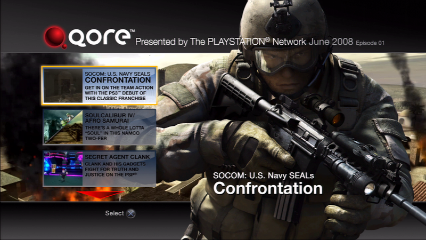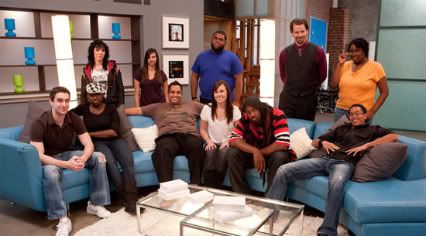
Sony had two excellent opportunities to create a strong online community but due to a lack of foresight failed to do so. The first was not to include a microphone free with every PS3. When it comes to voice chat in games there are a large number of people who do not want to hear other people talking and with good reason. When it leads to being abused or irritated in a game by a stranger the concept of voice chat seems less appealing, but by not including a microphone Sony set the standard for online interaction. A lot of online PS3 players don’t use microphones unless they are speaking to friends. This culture of silence gives the player a greater sense of isolation and lack of attachment to the online service. In a lot of games that may seem preferable, but for games that require teamwork and an ability to coordinate movement such as Fat Princess, something is lost by people’s unwillingness to communicate with each other. Despite the little we know about it, the upcoming game Journey from thatgamecompany, encapsulates the PSN experience perfectly. You can choose to cooperate with the other person within your game space, or you can ignore them and try to accomplish your goals alone. Either way your communication with them will be extremely limited.

By not including microphones they haven’t given the opportunity for online communication between PS3 players to mature. There is a negative perception of how Xbox players communicate with each other but in fact the Xbox Live service is allowing the way in which we interact online with each other to evolve. The PS3 and Xbox 360 will be the first time some people have played online games and as such for many it is a learning process. In years to come there may be a greater sense of accountability to people’s words or an emergence of different social standards in online gaming which could be a positive change. By not making voice chat the standard Sony runs the risk of keeping its players silent and with less of a connection to a Playstation community. The current state of online voice chat is often for one person to ask if anyone else has a microphone until they are muted, kicked from the game or leave. This lack of communication is reflected in the way that Sony distances itself from its consumer base. With no widely known Playstation community managers and only the Playstation Blog providing any real feedback hub Sony give the impression that they prefer talking down to rather than with their community. The missteps with Qore and the reality TV show The Tester only add to the feeling that they are out of touch with the interests of their potential community.

The second way in which Sony could have achieved a greater sense of community is through Home. There have been plenty of articles written about the major failings of Home, several written by myself, but the infrastructure that Sony has put in place still could define how consoles create strong and vibrant online communities in the future. The most important, and most controversial, would be to force the player to use Home.
Imagine if when you turned on the PS3 it would still have the XMB bar as it is now, but in place of the wallpaper and custom backgrounds would be your avatar in your virtual apartment. If you wanted to ignore it you could use the XMB bar as you currently do, but if you pressed the PS button the XMB bar would disappear. Then in your apartment would be a game shelf containing all of the PS3 games that you have played on it and you could browse and read information on those games. It would also display the trophies you had so far earned in that game, and elsewhere in the apartment would be a trophy shelf showing the last eight trophies you had earned, as the PSN card does now. Your friends list would be displayed on a large screen showing exactly what everyone else was playing. You would have a message box in much the same way as you do now, but the TV would also be capable of playing video or audio messages from your friends recorded using the Playstation Eye or headset. Currently one of the problems with Home is that navigating menus is an awkward and slow and whilst the alternative would be more cumbersome than the XMB bar, if they managed to speed up the process it could visually impart a lot of information to the player in a manner that was more digestible than the compartmentalized XMB bar. One of the big issues with Home is that it has no function at the moment; it is a separate aspect of the Playstation experience that needs to be loaded into.

Once you have Home as an integral feature of playing the PS3 then the hub event spaces that make up Home would fit more logically. Sony has made efforts to make the game spaces within Home more relevant to fans of the game, but much more could be done to make that part of the experience. The communities for individual games could grow surrounding their Home space. For games such as Street Fighter there are already plenty of communities dedicated to them, but for smaller downloadable games it would provide a real opportunity for players to discuss and discover more about them. The movie theatre in Home is an interesting concept but at the same time is utterly useless; anyone who has the internet already has access to the trailers which they display. But having screens showing interviews with developers or fan made documentaries about games would provide something unique to the service. Take Little Big Planet as an example; I’m sure that many people, like myself, enjoyed the game a lot at first then just moved on to something else. A Little Big Planet space in Home with videos of featured levels could remind people why they should dip back into the game and provide a space for the best and most innovative level designers to display their talents. Little Big Planet has always had a strong and vibrant community, but it was one that could only really be accessed through the game itself or by specifically seeking it out on the internet. Home could give games like Little Big Planet an expanded audience. But as it is so underutilized there is no incentive for companies to be more ambitious in terms of what they do in Home.

For Sony the incentives for improving Home should be obvious. It would be, as it is now, a marketing tool but a far more effective one. Of course with everyone using Home there would be more of a temptation to spend our money on the avatar clothing items, furniture and accessories which are already overpriced as it is. On a positive note it would create interest in smaller downloadable games which escape the notice of many. The fact that there aren’t demos for the majority of PSN titles is a severe handicap and so a block of text in the PSN store might not be enough to convince an uninformed audience that Joe Danger is actually an excellent game. Being able to see it in Home, and to read user reviews would be far more instructive. It could also highlight quality older games like Infamous in a far more appealing manner than the seemingly pointless Playstation Plus service. As far as I can see Playstation Plus is a huge step back for PSN in that it divides a service, and a community, into the ‘haves’ and the ‘have-nots’, and it does so without really giving a strong motivation for being in the ‘haves’. Rather than squeezing 50 bucks out of people to allow them to play demos early or get minor discounts, updating Home dramatically would pay for itself in increased revenue over time.

Home provided Sony with the greatest potential to create a strong and focused community. They managed to lose that potential and momentum through its delayed release, underwhelming features and distastefully obvious marketing objective. Perhaps the most ridiculous oversight is that you need to pay 5 bucks to set up a club. It isn’t that much money, but they should be doing everything in their power to encourage people to form clubs and in doing so their own online communities. There just isn’t enough to make forming and maintaining those clubs as appealing and engaging as it should be. Fundamentally the problem is that Home cannot do as much as it needs to do in order to be compulsory, which is why Sony decided to make it optional. Perhaps in future Playstation consoles they will have the technology and the manpower to make Home the home for the Playstation community, but as of this point they have damned it with faint effort. For now, there is no sense of a Playstation community. There is no place for Playstation gamers to truly call Home.
















Wow, you’re good! Great ideas about how to make Home a more accesible experience in here, encouragable too! You should send this article to sony and see what kinda feed back you get.
I’m a very solitary person, so much so that I’m actually GLAD there’s no voice chat on the PS3. It’s kinda hard to explain to most people exactly why I feel that way, because most don’t understand or belive me! Anyway, most people seem to like talking with eachother and I think you’re very right about sony’s missed oppertunities over the years concerning Home, the PSN and the other factors you mentioned. Just don’t ask me to support mics….
Great ideas for Home, which the majority of PS3 owners ignore. Having it loaded up when you turn on your PS3, would make it hard to ignore, and if they integrated things like Vidzone or the ability to play your music in your apartment, it would make it a lot more enticing to spend some time in.